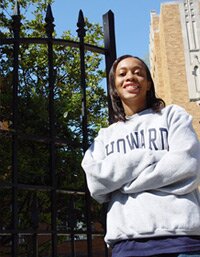 |
 |
 |
|
|
|||||||||||||
|
|
|||||||||||||
| Email Article | Printable Page |
Views of HBCUs Change as Mainstream Accepts More Blacks
First of two parts |
|
Photo credit: Howard Law School
Its law school is evidence of how much Howard University's mission has changed from its original vision as a theological seminary.
|
When members of the First Congressional Society of Washington first sat down and thought of establishing a theological seminary for blacks, they could not have imagined what it would become.
Approved for charter by President Andrew Johnson in 1867, the mission of Howard University quickly changed to a vision of a "University for the education of youth in the liberal arts and sciences and other departments."
Now, more than 130 years later, it embodies intellectual development and innovation for the world. Many students know its history and its successful graduates, but tend to forget the impact of Howard’s presence.
Howard was built when the country was in a state of unrest and still felt divided from the Civil War.
|
RELATED NEWS |
“Originally whites thought, ‘We don’t want them in our colleges so we’ll set up something for them, but give them less funding’,” said Emory Tolbert, a professor in the history department.
“The tradition of racism is to degrade and make all things ‘black’ inferior. But HBCUs were specifically created for the advancement of African Americans, and now, years later, alumni send their sons and daughters to them,” Tolbert said.
Bill Maxwell, writing in the St. Petersburg Times, reported that HBCUs have produced the bulk of today’s black middle class: 30 percent of blacks who hold doctorates, 35 percent of black lawyers, 50 percent of black engineers, 65 percent of black physicians.
Maxwell also cited research that found, “Professors encourage spirited exchange of subject matter, ideas, beliefs and opinions during class discussions at HBCU’s.”
The president of LeMoyne-Owen College in Memphis, James Wingate, agreed.
“Giving the underprepared student a chance to be nurtured, taught, coached, cajoled and encouraged ultimately to the point that they achieve and go on into the workforce and contribute to the gross national product -- that’s what it’s really all about. It’s not that other colleges can’t do that. It’s that HBCUs do it better,” Wingate said.
Marymount University sophomore Loren Hulen called the atmosphere at Howard lively.
“I applied to Howard University and was accepted; however, Marymount accepted me first and I decided a smaller school would probably be better for me. It’s funny; I’ve been to Howard at night and it’s kind of strange to see people still walking around on the Yard at 10 at night. Ten p.m. at Marymount, and everyone is in their rooms. The campus looks empty,” Hulen said.
“At Marymount, many people keep to themselves and sometimes it can feel like high school, because it can get very ‘clique-ish.’ Howard’s campus always has something going on . . . it almost makes me happy I went to MU. If I went to Howard, I would get too distracted,” Hulen said.
Marc Lamont Hill, author and professor at Temple University, recently wrote about the issues HBCUs are facing. The first challenge he cited was expanding opportunities for African Americans at Ivy League schools.
“Beginning with the 1960s cohort of affirmative action students, large numbers of black students were able to bypass the HBCU and matriculate directly into the White mainstream. Whereas scholars like Cornel West and Henry Louis Gates were able to enroll as undergraduates at Harvard and Yale University, their intellectual heroes and mentors had no such luxury." W.E.B. Du Bois "had to attend Fisk before obtaining a Ph.D. at Harvard,” Hill said.
Hill also contended that HBCUs play a different role today.
“Whereas previous generations saw an HBCU degree as a badge of honor and community solidarity, many of today’s students and parents see the black college as a secondary or tertiary alternative to Ivy League universities and elite liberal arts colleges. While this is partly due to the ever-expanding bourgeoisie sensibilities of the black middle class, it is also directly connected to the increased corporatization of higher education,” Hill wrote.
For Elysia Ross, a junior pre-pharmacy major at Howard, there was no other choice. “Despite all the statistics and what others think, I love Howard. There was no other option for me, not because I wasn’t qualified but because my heart was here," she said. "Just look at the history, it says it all.”
Posted Oct. 16, 2006
In News
Hip-Hop Generation Debated at "State of Black Union" Conference
Student Journalists Gear Up for HBCU Newspaper Conference
| Home | News | Sports | Culture | Voices | Images | Projects | About Us Copyright © 2007 Black College Wire. Black College Wire is a project of the Black College Communication Association and has partnerships with The National Association of Black Journalists and the Robert C. Maynard Institute for Journalism Education. |